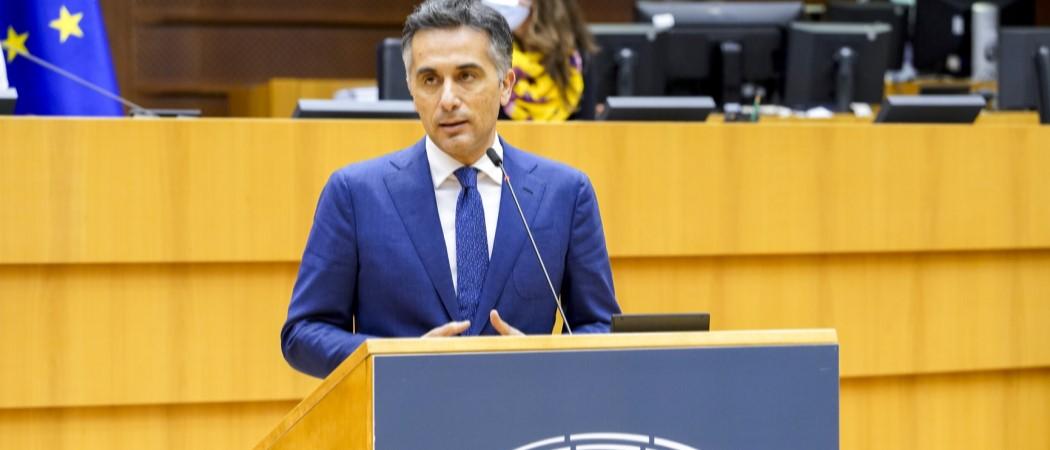All EU space activities now in a single orbit, in hopes of making Europe a global leader in space

Parliament’s rapporteur for the Space programme, Massimiliano Salini. Photo: European Parliament
The European Parliament has finalised a new €14.8 billion (in current prices) seven-year EU space programme, which will for the first time bring together all EU space activities under one roof.
Running the space programme under a single regulation is intended to get rid of redundancy and overlaps between the European Space Agency and the European Commission.
“What was missing was a single structure that would involve a strategy, a European strategy, which would play the role of bringing together the entire European space programme,” the Parliament’s rapporteur for the programme, Massimiliano Salini, said in the final debate. ”This is something that we’ve come up with now.”
The goal is to make the EU a global player in space, rivalling the position of the US and China.
Innovation is at the heart of this ambition, said Thierry Breton, EU commissioner for the internal market. “It’s thanks to innovation that we will keep Europe a space power. We need to invest massively in our talents, ideas, start-ups and SMEs, and perhaps sometimes take more risks than we have. It’s a change of approach, and we need that,” he told MEPs.
Space is also key to Europe’s strategic autonomy. Without its own satellites in space, the EU would depend on the technology provided by its competitors, putting essential communications in their hands.
“Space is not a gadget to play with. No, it’s of paramount importance for Europe to be a world power. Space is essential for our strategic autonomy, so we do not depend on satellites from other countries in the world,” said Renew MEP Christophe Grudler.
But many MEPs urged the EU to be wary of competing in the global space race if its drives militarisation. “It’s very clear that the EU is getting in on the game started by the US, of seeing space as the new frontier of war,” said Clare Daly of the Left party. “Space has always been a cooperative area, and [that] this turned to aggressive competition, started by the US, is a departure [from that spirit],” she said.
Space surveillance
The programme will support existing EU space initiatives, such as Galileo and Copernicus, as well as some new tools for space surveillance and satellite communications.
The biggest slice of the pie, €9.1 billion, will fund the satellite navigation system Galileo, and the European Geostationary Navigation Overlay service, which supplements Galileo’s observations by double-checking the accuracy of its positioning data.
Another €5.42 billion will be invested in the Copernicus earth observation system, to run services monitoring the atmosphere, marine and land environments, climate, emergencies and security.
A further €442 million will be spent on monitoring space hazards and providing secure communication tools for different missions managed by the EU and member states.
All this will be overseen by three institutions. The Commission will manage the programme; the new EU Agency for the Space Programme (EUSPA) will manage Galileo and the European Geostationary Navigation Overlay Service; while the European Space Agency will be responsible for research and development.
To some MEPs the new space programme is only the beginning. Next, Europe needs a uniform space law to provide a clear plan and certainty for the private sector. “We are in the midst of a new space race, and if Europe continues to proceed as it has done so far, we will lose it,” said Green MEP Niklas Nienaß.
Just last week EU auditors declared the EU is not doing enough to exploit its space programmes. The programmes are providing valuable data and services, the auditors ruled, but a better regulatory framework is needed to support the uptake of the services and technologies they produce.
If successful, the new regulation could provide the necessary framework to better exploit space research. “As most measures for 2021-2027 are still on the launch pad, we hope that our audit will mark the countdown to a new set of actions that can efficiently help the EU to reap the full benefits of these valuable assets,” said Mihails Kozlovs, a member of the European Court of Auditors in charge of the report on space research.





 A unique international forum for public research organisations and companies to connect their external engagement with strategic interests around their R&D system.
A unique international forum for public research organisations and companies to connect their external engagement with strategic interests around their R&D system.